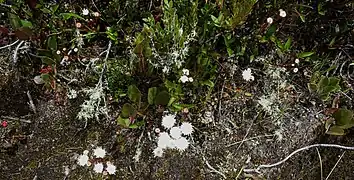Ageratina tinifolia
Ageratina tinifolia is a species of flowering plant in the family Asteraceae.[2][3] It is found in the Andes from southern Colombia (departments of Antioquia, Boyacá, Caldas, Cauca, Cesar, Cundinamarca, Huila, Meta, Nariño, Norte de Santander, Putumayo, Quindío, Risaralda, Santander and Tolima) to Venezuela, where it typically occurs in the transition zone of high Andean forests and páramo vegetation.
| Ageratina tinifolia | |
|---|---|
 | |
| Ageratina tinifolia at Ocetá Páramo, Colombia | |
| Scientific classification | |
| Kingdom: | Plantae |
| Clade: | Tracheophytes |
| Clade: | Angiosperms |
| Clade: | Eudicots |
| Clade: | Asterids |
| Order: | Asterales |
| Family: | Asteraceae |
| Genus: | Ageratina |
| Species: | A. tinifolia |
| Binomial name | |
| Ageratina tinifolia (Kunth) R.M. King & H. Rob[1] | |
| Synonyms | |
Etymology
The species epithet is derived from the Greek τεινο, "wide", referring to the shape of the flowers. In the publication about the Royal Botanical Expedition to New Granada, headed by Spanish botanist and priest José Celestino Mutis, the Spanish name is registered as "pegajosa". Other reported names for the plant include "amargoso" in Sumapaz, "ayubara" in the Páramo de las Papas, Cauca, "chilco" in El Cocuy, Boyacá, La Calera, Cundinamarca and Angostura, Antioquia and "chilco amargo" in Soacha, Cundinamarca.[4]
Description
The species was first described as part of the genus Ageratina in 1970 by King and Rob. Earlier reports include Von Humboldt and Bonpland as "grows in New Granada" and by German botanists as Eupatorium tinifolium by Carl Sigismund Kunth in 1818 and Eupatorium lehmannianum by Friedrich Wilhelm Klatt in 1886.[4]
Distribution
It occurs in the Andean region in high Andean forest biomes at altitudes ranging from 2,500 to 3,700 metres (8,200 to 12,100 ft) and on páramos, such as at altitudes of 3,000 to 3,100 metres (9,800 to 10,200 ft) in La Chorrera, Une, Cundinamarca.[5] The plant is a typical species at the transition of the two biomes.[6][7] To the north on the Altiplano Cundiboyacense in the Cárpatos forest reserve of Guasca, Cundinamarca, the plant is one of the most abundant in the higher elevation areas, dominated by Weinmannia pinnata and Miconia theaezans.[8] Ageratina tinifolia is the most dominant species in the northeastern part of the Llano de Paletará, Coconuco, Cauca.[9] The plant is also abundant in the El Volcán forest reserve of Pamplona, Norte de Santander.[10]
References
- R.M.King & H.Rob., Phytologia 9 227 1970
- Ageratina tinifolia at Catalogue of Life.org
- Ageratina tinifolia at Tropicos.org
- (in Spanish) Ageratina tinifolia
- Rodríguez & Guerrero, 2015, p.11
- Rodríguez & Guerrero, 2015, p.40
- Castellanos & Bonilla, 2011, p.167
- Cantillo et al., 2009, p.111
- Restrepo & Duque, 1992, p.28
- Sánchez et al., 2007, p.31
Bibliography
- Arellano P., Henry, and J. Orlando Rángel Ch. 2008. Patrones en la distribución de la vegetación en áreas de páramo de Colombia: heterogeneidad y dependencia espacial - Patterns in the distribution of vegetation in paramo areas: heterogeneity and spacial [sic] dependence. Caldasia 30. 355–411. Accessed 2018-08-21.
- Cantillo Higuera, Edgard Ernesto; Alberto Lozada Silva, and Julián Pinzón González. 2009. Caracterización sucesional para la restauración de la reserva forestal Cárpatos, Guasca, Cundinamarca - Successional study for the restoration at Cárpatos forest reserve in Guasca, Cundinamarca. Revista Colombia Forestal 12. 103–118. Accessed 2018-08-21.
- Castellanos Castro, Carolina, and María Argenis Bonilla. 2011. Grupos funcionales de plantas con potencial uso para la restauración en bordes de avance de un bosque altoandino - Plant Functional Groups of Potential Restoration Use in Advancing Edges of High Andean Forests. Acta Biológica Colombiana 16. 153–174. Accessed 2018-08-21.
- Restrepo, Carla, and Andrés Duque. 1992. Tipos de vegetación del Llano de Paletará, Cordillera Central, Colombia. Caldasia 17. 21–34. Accessed 2018-08-21.
- Rodríguez Camacho, Laura Marcela, and Ana Carolina Guerrero Urian. 2015. Composición y diversidad florística vascular de bosque alto andino, en el predio La Chorrera, Municipio Une, Cundinamarca, Colombia, 1–45. Universidad Distrital Francisco José de Caldas. Accessed 2018-08-21.
- Sánchez Montaño, L.R.; S.M Gelviz G., and Ortega F. Solano. 2007. Plantas con flores de la Reserva El Volcán, vereda Alto Grande, Pamplona, Norte de Santander. Bistua 5. 27–34. Accessed 2018-08-21.
 Data related to Ageratina tinifolia at Wikispecies
Data related to Ageratina tinifolia at Wikispecies Media related to Ageratina tinifolia at Wikimedia Commons
Media related to Ageratina tinifolia at Wikimedia Commons